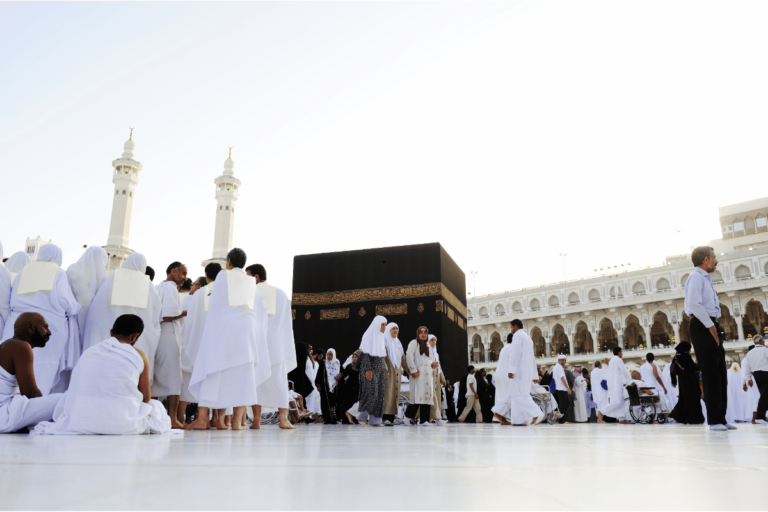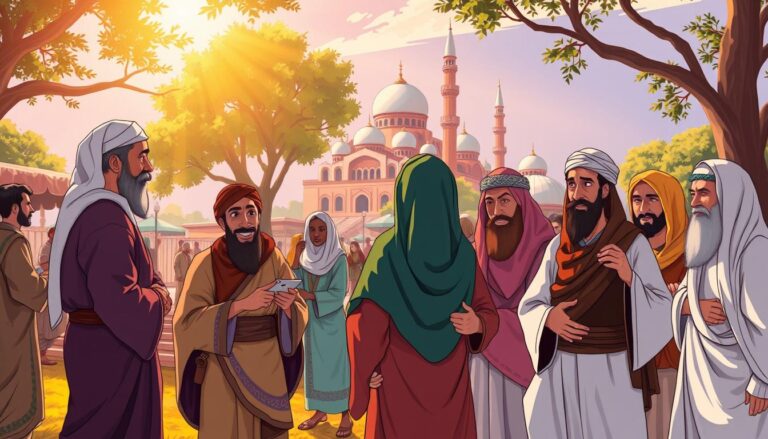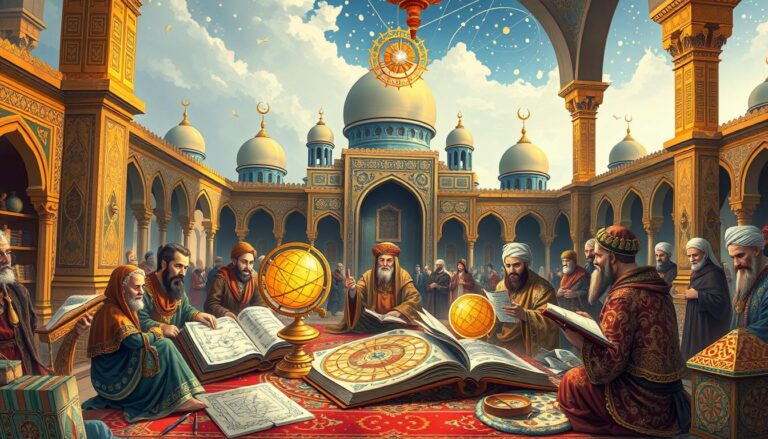5 Prophets in Islam You Should Know About
Ever wondered why some prophets are so important in Islam? Islam has many prophets, but five are especially key. These prophets, known as the Ul al-‘Azm, greatly shaped Islamic history and teachings.
Noah’s bravery and Muhammad’s final message are just a few examples. Their stories of courage and wisdom inspire millions. Let’s dive into the lives of these five prophets and learn from their experiences.
The Quran tells us about these prophets and their missions. Their stories cover thousands of years, from Noah’s time to Muhammad’s revelations. Despite different challenges, they all aimed to guide people to worship one God.
Key Takeaways
- Islam recognizes five major prophets known as Ul al-‘Azm.
- These prophets are Noah, Abraham, Moses, Jesus, and Muhammad.
- Each prophet brought a universal message to humanity.
- Their stories are detailed in the Quran for guidance.
- These prophets played crucial roles in spreading monotheism.
- Understanding their lives offers valuable lessons for Muslims today.
Introduction to Prophets in Islam
Prophets are key in the Islamic faith. They act as messengers of Allah, sharing divine revelations and guiding people to do good. The idea of prophethood is central to Islam, focusing on believing in one God and living a moral life.
The Role of Prophets in Islamic Faith
In Islam, prophets are special people who share Allah’s message and set examples. They connect humans with God, teaching His words to their communities. The Quran says every community has had a messenger, showing prophethood’s importance in Islam.
The Concept of Prophethood in Islam
Prophethood, or nubuwwah, is a key belief in Islam. It’s one of the six main beliefs of Islam. Muslims believe in many prophets, like Adam, Noah, Abraham, Moses, Jesus, and Muhammad. The Quran lists 25 prophets, showing they all aimed to guide people to worship one God.
Qualities of Islamic Prophets
Islamic prophets have special qualities. They are known for being truthful, trustworthy, and morally excellent. They are also protected from major sins, known as isma. They show what it means to live a good life and have strong faith, even when things get tough.
- Truthfulness and trustworthiness
- Moral excellence and exemplary conduct
- Strong faith and perseverance
- Ability to receive and convey divine revelations
Learning about prophets helps Muslims see why following their teachings is important. It encourages them to aim for moral excellence in their own lives.
The Significance of the Ul al-‘Azm Prophets
In Islamic tradition, the Ul al-‘Azm prophets are very important. These major prophets include Noah, Abraham, Moses, Jesus, and Muhammad. They are known for their strong faith and key roles in religious history.
These prophets received a special covenant from Allah. This covenant makes them stand out in Islamic teachings. Each prophet faced big challenges but stayed true to Allah’s word.
Noah called his people to worship Allah for 950 years. Abraham, known as Al Khalil, started the monotheistic religions that shape our world. Moses led the Israelites out of Egypt and got the Ten Commandments.
Jesus, born miraculously, updated Moses’ teachings. He brought new life to the faith.
“And every ummah had a messenger.” – Holy Quran
Prophet Muhammad became the final messenger at 40. His teachings ended the messages of all previous prophets. He is called “Seal of the Prophets.” The Ul al-‘Azm prophets’ messages guide millions of believers today.
Prophet Noah (Nuh): The First Great Prophet
Noah is a key figure in Islamic history. He is known for his strong faith and perseverance. His story teaches us about the importance of following Allah’s message and staying steadfast in our beliefs.
Noah’s Life and Mission
Noah’s prophetic journey lasted 950 years. He spent his life preaching to his people, telling them to worship Allah alone. Despite being mocked and rejected, Noah never gave up. His patience is a powerful example of perseverance in faith.
The Great Flood and Noah’s Ark
Noah’s people ignored his warnings, so Allah told him to build an ark. Noah faced ridicule as he built the ark, but he didn’t let it stop him. The Great Flood came, destroying the disbelievers and saving Noah, his family, and animals.
Lessons from Noah’s Perseverance
Noah’s story teaches us about faith and resilience. His dedication to Allah’s message, despite centuries of rejection, shows the value of staying true to our beliefs. The ark represents hope and the reward for steadfast faith. Noah’s journey teaches us that with patience and trust in Allah, we can overcome any challenge.
- Persistence in the face of adversity
- Unwavering faith in Allah’s plan
- The importance of following divine guidance
Noah’s legacy inspires believers today. It shows the power of perseverance and the triumph of faith over disbelief.
Prophet Abraham (Ibrahim): The Friend of Allah
Abraham, known as Khalilullah in Islamic tradition, was a key figure in monotheism. He was born in 1996 BCE in Ur al-Chaldees and lived for 175 years. He passed away in 1821 BCE in Hebron. His life shows his strong faith and devotion to Allah.
Abraham believed in one God and refused to worship idols. He faced opposition, even from his father. This made him known as “Friend of God” or Khalilullah in Arabic.
Abraham built the Kaaba with his son Ishmael. Muslims see this as the first house of worship on Earth. This act shows Abraham’s importance in Islamic faith.
“Indeed, Abraham was a [comprehensive] leader, devoutly obedient to Allah, inclining toward truth, and he was not of those who associate others with Allah.” – Quran 16:120
The story of Abraham’s willingness to sacrifice his son is celebrated during Eid al-Adha. It shows the ultimate test of faith and submission. Abraham’s sacrifice is a lesson for Muslims everywhere.
- Abraham had two sons who became prophets: Ishmael and Isaac
- He is considered the ancestor of both Ishmaelite Arabs and Israelites
- Abraham played a key role in cleansing the world of idolatry
Abraham’s legacy inspires millions of Muslims. His life shows the importance of faith, obedience, and sacrifice. Through his actions and teachings, Abraham helped shape the monotheistic tradition for centuries.
Prophet Moses (Musa): The One Who Spoke with Allah
Moses, known as Kalimullah in Islam, is very important in the faith. His life is full of challenges and victories, teaching us valuable lessons. The Quran talks about Moses 136 times, making him the most mentioned person in Islamic scripture.
Moses’ Early Life and Call to Prophethood
Moses was born in Egypt during Pharaoh’s rule, facing danger from the start. His mother, fearing for his safety, put him in the river. Pharaoh’s wife found and adopted him, starting his unique journey.
As an adult, Moses fled to Midian after accidentally killing someone. There, he found refuge and married.
The Exodus and the Ten Commandments
God chose Moses to lead the Israelites out of Egypt. The Exodus was a key moment in his life. At the Red Sea, Moses showed great faith in Allah.
After escaping, Moses received the Torah and the Ten Commandments. This happened during a forty-night stay on Mount Sinai.
Moses’ Legacy in Islam
Muslims admire Moses for talking directly to Allah, earning him the title Kalimullah. They respect his revelations in the Torah. The Quran corrects some historical mistakes about Moses, showing him as a grateful servant of Allah.
His story is similar to that of Prophet Muhammad, highlighting the ongoing divine guidance in Islam.
“Verily, Moses was chosen by Allah above men by His Messages and by His speaking to him.”
Prophet Jesus (Isa): The Spirit of Allah
In Islamic tradition, Prophet Jesus, known as Isa, is seen as Ruhullah, the Spirit of Allah. He was born to the Virgin Mary, with a life filled with miracles and teachings. The Quran talks about Jesus over 90 times in 15 different chapters, showing his importance in Islam.
Jesus’ birth shows Allah’s power. The Quran says he was born under a date palm tree by a freshwater stream, likely in spring or summer. This story questions the common belief of December 25th as his birthdate. Also, Jesus was untouched by the Devil at birth, a unique trait among prophets.
As a prophet, Jesus received the Gospel and did many miracles. The Quran tells of his healing the blind and lepers, showing Allah’s favor. These miracles proved his prophethood and his message of monotheism.
“The Messiah, Jesus son of Mary, was no more than a messenger of Allah and His Word, which He bestowed on Mary, and a Spirit from Him.” – Quran 4:171
Islam sees Jesus as a great prophet but differs from Christian views on his divinity. The Quran stresses the oneness of Allah and rejects the Trinity. It also says Jesus was not crucified, but it was made to seem so.
Islamic prophecies talk about Jesus’ second coming in Damascus, where he will pray behind Imam Mahdi in Masjid Al-Aqsa. This future role highlights his ongoing importance in Islamic eschatology. Finally, Jesus will be buried next to Prophet Muhammad in Madinah, linking them as Allah’s messengers.
5 Prophets in Islam You Should Know About
Islam honors five top prophets called Ulul’ Azam. They were key in spreading the belief in one God and guiding Islamic teachings. Their stories and messages inspire millions of Muslims today.
Common Themes in Their Messages
The five prophets shared important messages. They all talked about:
- The oneness of Allah (monotheism)
- Moral righteousness
- Preparation for the Day of Judgment
The Quran shows their unity in Surah Al-Baqarah (2:285). It says believers see no difference in their messages.
Unique Contributions to Islamic Teachings
Each prophet brought something special to Islamic teachings:
- Muhammad: Known as the Leader of the Prophets and Messengers
- Ibrahim (Abraham): Called the Friend of Allah
- Musa (Moses): Recognized as the one who heard Allah’s speech
- Isa (Jesus): Referred to as the Spirit of Allah
- Nuh (Noah): Titled the Confidant of Allah
Importance of Understanding These Prophets
It’s crucial for Muslims to know the stories and teachings of these five prophets. It shows the ongoing divine guidance in history. The Quran talks about their importance in Surah Al-Ahzab (33:7).
“We believe in Allah and what has been revealed to us and what was revealed to Abraham, Ishmael, Isaac, Jacob, and the Descendants, and in what was given to Moses and Jesus and to the prophets from their Lord. We make no distinction between any of them, and we are Muslims [submitting] to Him.” – Quran 3:84
Prophet Muhammad: The Seal of the Prophets
Prophet Muhammad is a key figure in Islam, known as the Seal of the Prophets. He was born in Mecca and lost his parents early. Yet, he grew up with a reputation for honesty and trustworthiness.
Muhammad’s Life and Prophethood
At 12, Muhammad traveled to Syria with his uncle. There, a Christian monk named Bahira saw him as a future prophet. This moment hinted at Muhammad’s role in spreading Islam.
The Quran talks about Muhammad four times, calling him the Messenger of Allah.
The Revelation of the Quran
The Quran says Muhammad was sent as a prophet after a gap. This divine message is the heart of Islamic teachings. It’s interesting that the Bible also talks about a prophet after Moses, seen by Muslims as Muhammad.
Muhammad’s Impact on Islamic Faith and Practice
Muhammad’s influence on Islam is huge. His Sunnah, or teachings, is the basis of Islamic law. The Quran calls him the spiritual father of his followers.
His teachings will guide future generations. Muslims believe his spiritual children will be more than any other prophet’s.
“Muhammad is not the father of any of your men, but he is the Messenger of Allah and the Seal of the Prophets.” – Quran 33:40
This verse shows Muhammad as the final prophet, ending the line of prophethood. His life and teachings still guide Muslims today, shaping their faith and practice.
The Continuity of Prophetic Messages in Islam
The prophetic tradition is key in Islamic theology. It creates a long-lasting tapestry of divine guidance. From Adam to Muhammad, each prophet added to the teachings of those before them. This shows Allah’s unity for all humans.
In Islam, prophets like Noah, Abraham, Moses, and Jesus are connected. They all taught about the oneness of God and right living. Prophet Muhammad, as the last messenger, brought the Quran, the ultimate divine message.
Islamic theology sees these prophets’ stories as part of a single narrative. This narrative is about faith and ethics. It helps Muslims see how divine guidance has evolved over time. It also stresses the need to follow the moral teachings of all prophets.
The idea of prophetic continuity in Islam shows its message is universal. It means the core teachings of faith have stayed the same, even as the world changed. This idea of a constant divine message strengthens many believers’ faith in Islam’s eternal wisdom.
Source Links
- The Five Great Prophets of Allah in the Quran
- How Many Prophets Are There in Islam? – OIN’s News
- Prophets and messengers in Islam
- Complete Story of All 25 Prophets of Islam – My Islam
- Arch-Prophets (Ulul
- Ulul’azm Anbiya’ (Arch-Prophets) and All Other Prophets
- The Story of Prophet Nuh (عَلَيْهِ ٱلسَّلَامُ) – My Islam
- Noah in Islam
- Prophet Noah & his journey – British Muslim Magazine
- Abraham in Islam
- Abraham (‘A), The Friend Of Allah
- Story of Moses in the Quran7 min read
- Moses in Islam
- 7 Things Muslims Should Know about Prophet ‘Isa (as)
- A Comprehensive Listing of References to Jesus (‘Isa) in the Qur’an – Apologetics
- The 5 Top Ranking Prophets – Muwatta.com – The People of Madīnah
- Prophets of Allah – Prophet Muhammad: Seal of the Prophets
- Seal of the Prophets
- Prophet Muhammad (pbuh) : The Seal of Prophets
- Prophetic Tradition – (Intro to Philosophy) – Vocab, Definition, Explanations | Fiveable
- Islamic eschatology







